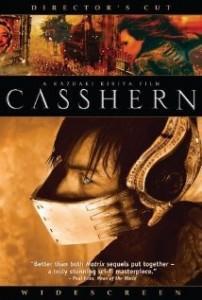 After 50 years of bitter warfare in the late 21st century, a new crisis looms. A threat to the future and the overall existence of mankind. But, there is hope a savior will emerge… Casshern. Casshern is an action-packed, sci-fi thriller that blends Japanamation and manga-inspired live action to create a new hybrid form of filmmaking that is both visually stunning and thought provoking.
After 50 years of bitter warfare in the late 21st century, a new crisis looms. A threat to the future and the overall existence of mankind. But, there is hope a savior will emerge… Casshern. Casshern is an action-packed, sci-fi thriller that blends Japanamation and manga-inspired live action to create a new hybrid form of filmmaking that is both visually stunning and thought provoking.
Casshern (2004)
Kazuaki Kiriya’s 2004 adaptation of an anime series that first aired in the mid-Seventies contains the feel of a comic strip in places but the overall theme is of a future depiction of our world devastated by war. Two forces, the Eastern Federation and Europa, have fought for 50 years, with the Eastern Federation prevailing and holding sway over a ruined world. Amidst the aftermath of this endless struggle appears a new kind of hope for the future but one that only brings further carnage rather than the intended benefits.
The focal point to the film is the Azuma family. At the start, Dr Kotaro Azuma (Akira Terao) reveals research he has conducted into neo cells, found only in a small ethnic group, but capable of being manipulated and transformed into any organ or part in the human body for donation purposes. Dr Azuma is eager to make his research work to save his ill wife, Midori (Kanako Higuchi), but also has to contend with his son, Tetsuya (Yusuke Iseya), who against his father’s wishes joins the army to help clear up lingering insurgence against the Eastern Federation. When Tetsuya is killed a year later his body is brought to Dr Azuma’s lab for a funeral procession. After a year of work, Dr Azuma has created body parts from the neo cells but hasn’t made the necessary breakthrough to adapt them to humans. When a mysterious bolt of lightning strikes the lab and filters down into the lab, the body parts join together to form undead people who emerge from the red pools and proceed to escape into the city. The group leader, Burai (Toshiaki Karasawa), declares war on mankind and dubs his race “Neoroids.” The only hope for mankind is Dr Azuma’s son, Tetsuya, who is revived by his father after immersion in the same red pools the Neoroids emerged from. What follows is another bloody war for an already exhausted world.
Casshern boasts some impressive effects but also plays out like a comic. The battles themselves are plentiful but the film plays out mostly as a drama, reflecting the impact war has upon the land and its people. In one beautiful scene, Tetsuya and his fiancé, Luna (Kumiko Aso), are alone in a beautiful forest when Luna speaks of the events that have unfolded and questions why there is the need for war. It’s a brief moment of poignant reflection amidst the fast-paced action. Throughout, the image of the future is bleak, offering no glorifying element to war and reminding us it leaves behind only misery for those that have lived through it.
Women are portrayed as angelic in Casshern with Tetsuya’s mother, Midori, being hailed by Neoroid leader, Burai, as their savior. Luna is constantly caught in the midst of the conflict, never resorting to violence herself, but always questioning the reason behind the atrocities. The men who take center stage are all flawed. Dr Azuma is aiming to do good with his research but in the end he is driven to obsession in saving his wife, forsaking his son in the process. Burai only appears tender when speaking to Midori who tries to ground his hatred and need for revenge, and make him try and feel compassion. Tetsuya may be the hero of the film but he carries a dark secret, one that is revealed right at the very end. Casshern combines some great effects with a very sincere depiction of war in all its brutality. It’s a truly unique film, harshly marked down by critics but more than worthy of a place as one of my masterpieces.
Enjoyed the read? Subscribe!
